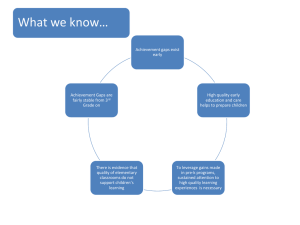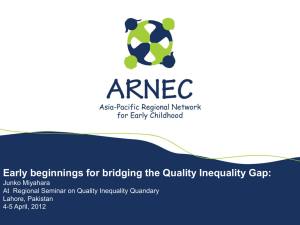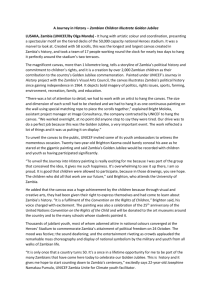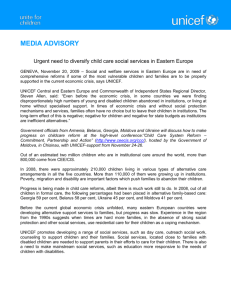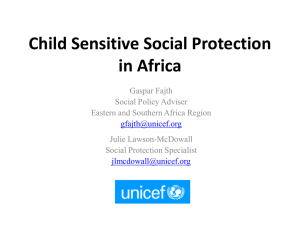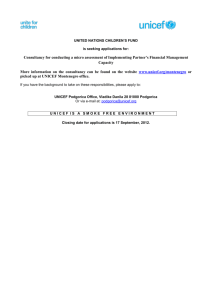Terms of Reference with Guidance notes
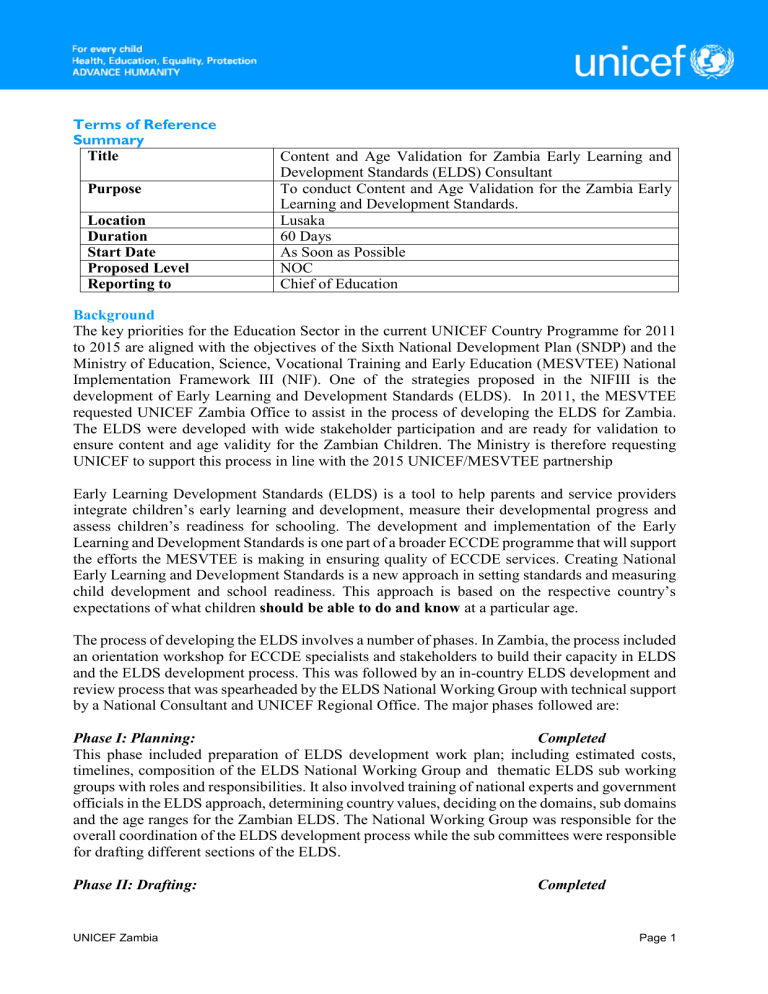
Terms of Reference
Summary
Title
Purpose
Content and Age Validation for Zambia Early Learning and
Development Standards (ELDS) Consultant
To conduct Content and Age Validation for the Zambia Early
Learning and Development Standards.
Location
Duration
Start Date
Proposed Level
Lusaka
60 Days
As Soon as Possible
NOC
Reporting to
Background
Chief of Education
The key priorities for the Education Sector in the current UNICEF Country Programme for 2011 to 2015 are aligned with the objectives of the Sixth National Development Plan (SNDP) and the
Ministry of Education, Science, Vocational Training and Early Education (MESVTEE) National
Implementation Framework III (NIF). One of the strategies proposed in the NIFIII is the development of Early Learning and Development Standards (ELDS). In 2011, the MESVTEE requested UNICEF Zambia Office to assist in the process of developing the ELDS for Zambia.
The ELDS were developed with wide stakeholder participation and are ready for validation to ensure content and age validity for the Zambian Children. The Ministry is therefore requesting
UNICEF to support this process in line with the 2015 UNICEF/MESVTEE partnership
Early Learning Development Standards (ELDS) is a tool to help parents and service providers integrate children’s early learning and development, measure their developmental progress and assess children’s readiness for schooling. The development and implementation of the Early
Learning and Development Standards is one part of a broader ECCDE programme that will support the efforts the MESVTEE is making in ensuring quality of ECCDE services. Creating National
Early Learning and Development Standards is a new approach in setting standards and measuring child development and school readiness. This approach is based on the respective country’s expectations of what children should be able to do and know at a particular age.
The process of developing the ELDS involves a number of phases. In Zambia, the process included an orientation workshop for ECCDE specialists and stakeholders to build their capacity in ELDS and the ELDS development process. This was followed by an in-country ELDS development and review process that was spearheaded by the ELDS National Working Group with technical support by a National Consultant and UNICEF Regional Office. The major phases followed are:
Phase I: Planning: Completed
This phase included preparation of ELDS development work plan; including estimated costs, timelines, composition of the ELDS National Working Group and thematic ELDS sub working groups with roles and responsibilities. It also involved training of national experts and government officials in the ELDS approach, determining country values, deciding on the domains, sub domains and the age ranges for the Zambian ELDS. The National Working Group was responsible for the overall coordination of the ELDS development process while the sub committees were responsible for drafting different sections of the ELDS.
Phase II: Drafting: Completed
UNICEF Zambia Page 1
This stage involved the actual writing of the first draft ELDS. This was done by an ELDS Working
Group composed of a diverse group of relevant professionals including policy makers, technical experts and service providers from different backgrounds like Education, Health, Community
Development, Protection, Nutrition etc. Thematic working groups were formed to draft specific themes of the ELDS with technical support from the National Consultant and the UNICEF
Regional Office.
Phase III: Review and Revision: Completed
The first draft working document was compiled by a National Consultant and reviewed by stakeholders and the UNICEF Regional Office through the ELDS Consultants who made comments on the document and these incorporated during the revision of the ELDS by the National
Working Group. This process has been completed and comments were incorporated in the document.
Phase IV: Content and Age Validation: Next Step
Content and Age Validation are important stages in the ELDS development process. These stages give credibility to the ELDS.
The purpose of Content Validation is to determine the extent to which the ELDS represent national values, expectations, and the scientific conceptualization of child development. This phase include a systematic process for ensuring that the content of the standards is accurate and appropriate for
Zambian children and for the age ranges of the children covered. Content Validation is a technique that is used to ensure accuracy of all levels of the framework: i.e. Domains, Standards, Indicators and Preparatory Learning Activities.
The purpose of Age Validation is to determine whether the expectations are accurate and valid for the specific ages of the Zambian children as indicated in the standards. It assesses age expectations, the anticipated accomplishment for the developing children, and whether these expectations are too easy, too advanced, or just right for the indicated ages of the children. This will involve assessing the extent to which the set indicators and targets in the ELDS are appropriate for the
Zambian Children.
Phase V: Finalization and Approval After Validation
Phase V includes post-validation revision and finalization of the standards, as well as formal approval by the Ministry of Education, Science, Vocational Training and Early Education.
Phase VI: Dissemination and Implementation of the standards: After approval
This will involve dissemination of the ELDs to the public and development of systems to roll out the ELDS in processes like- advocacy, policy development, monitoring and evaluation of child development programmes, curriculum design and review, development of parenting programmes, and individual child assessment tools.
Justification
Content and Age Validation of the ELDS is very important because the purpose is to determine the extent to which the ELDS represent national values, expectations, and the scientific conceptualizations of child development. The Overarching Question to be addressed is “To what extent do the Early Learning and Development Standards reflect the content and a ge for what
UNICEF Zambia Page 2
children in Zambia should know and be able to do? To what extent are the standards and indicators appropriate for the Zambian children?”
Age Validation is important because it determines the accuracy of the indicators for the children of Zambia. It indicates the degree to which the indicators that have been developed are appropriate for the ages of the children for whom they are intended. Both Content and Age Validation are ways to assure that the standards are scientifically accurate and credible for the Zambian children.
Objective.
To conduct Content and Age Validation for the Early Learning and Development Standards for
Zambia.
Tasks and Responsibilities
Develop a validation design, methodology and tools for the ELDS content and age validation study
Conduct Content and Age validation for the ELDS for Zambia.
Conduct a stakeholders workshop to disseminate validation findings and get stakeholders feedback
Finalise the ELDS for Zambia based on the Content and Validation study and stakeholder feedback
Document the whole process of ELDS content and age validation.
The Consultant will be expected to address the following:
Answer the Overarching Question – To what extent do the Early Learning and Development
Standards reflect the content and age for what children in Zambia should know and be able to do ?
Breadth – To what extent are all aspects of development and learning included in the ELDS?
Balance – To what extent are the domains represented in comparatively equal distribution?
Depth – Are there enough standards and indicators in each domain to reflect its scope?
Accuracy – To what extent do the indicators accurately reflect the standards? To what extent do the standards accurately reflect the domain?
Hierarchical – To what extent are indicators listed in a hierarchical order?
Cultural inclusion – To what extent do the ELDS include sufficient attention to cultural diversity?
Linkages To what extent do the standards and indicators link with other standards/instruments that are in use or are being considered in Zambia?
Are the indicators age appropriate?
To what extent are the indicators age appropriate for most of the Zambian children?
Are the indicators too easy, too hard, or just right for the Zambian children of a given age?
To what extent are the expectations for children’s development and learning correct for their age given the uses for education, parenting programmes, program evaluation, and national monitoring?
Methodology
UNICEF Zambia Page 3
The qualitative and quantitative research paradigm will be used for the Content and Age Validation process. For Content Validation the consultants will need to collect data from knowledgeable parties who have not been involved in the development of the ELDS for Zambia. It is important that these individuals know a good deal about children’s development so that they can render solid judgments regarding the quality of the standards. For Age Validation, data must be collected on a diverse sample of children in the country.
The sample and population for age validation will include all the 10 provinces of Zambia. The sample should represent both the urban and rural characteristics of the Zambian population and provide a representative landscape in terms of cultural diversity.
The purposive and random sampling methods will be used to select the sample. Purposive sampling will be used to select the provinces, districts and urban rural categories. Parents, children, and other stakeholders will be randomly selected. Data will be collected through structured and semi structured interviews in order to collect quantitative data for age validation and qualitative data for content validation respectively. The Consultant should ensure that the Research Assistants have adequate experience in qualitative and quantitative research methods and should undergo a comprehensive training before they commence the assignment.
Expected Deliverables.
The timeline of this task is from 3 rd August 2015 to 6 rd November, 2015 and consists of 60 consultancy days. Deliverables and expected dates of submission are:
Tasks
Develop an Inception report and literature review to understand
Expected Deliverables
Inception report with summary of literature review and detailed work plan, validation design, methodology, tools/instruments and timelines
Estimated
No. of days
05 the subject matter, scope of work and expectations.
Field data collection and analysis to validate the content and age of the
ELDS
In collaboration with
MESVTEE organize a workshop to present the ELDS validation report and get feedback.
Submission of the draft validation report to
MESVTEE.
Dissemination of validation report conducted and feedback received.
50
01
UNICEF Zambia Page 4
Finalization of the
ELDS Validation
Report and revision of the ELDS.
Present the final document to Top
Management
Working Modality
Submission of the final validation report and revised ELDS document to Ministry of Education
Science, Vocational Training and Early Education
Submission of the report to Top management of
MESVTEE
3
1
The Consultancy will be undertaken in the framework of the Ministry of Education, Science,
Vocational Training and Early Education, and UNICEF collaboration. The Consultant will report and be supervised by the MESVTEE through the Director of Curriculum and Standards and the
UNICEF Chief of Education.
The ELDS Technical Working group will provide technical support to the
Consultant
Budget: Payment Schedule
As per UNICEF rules, a consultant will be paid on a per-task basis upon successful completion of specific tasks and the satisfactory submission of deliverables.
Proportion of
Total
Expected Deliverable
40% Upon satisfactory submission and approval of Inception report. (This payment will also be used for field data collection)
Upon satisfactory submission of the first draft report and 30% presentation
30% Upon satisfactory submission of the final report.
Qualification/Specialized knowledge and Experience
The study will be outsourced to a qualified National or International Consultant who did not participate in the ELDS development process. (If an International Consultant is selected, he/she will be expected to work with a national consultant in order to build local capacity in this process)
The lead consultant should have the following demonstrated competencies:
Minimum of a Master s degree in early childhood development, education, psychology, or in a relevant field of social sciences/ behavioural sciences/health sciences.
Over 10 years of relevant experience
Experience in drafting and validation of ELDS or any related assignment will be an advantage
Expertise and experience in quantitative and qualitative research methods, preferably in the area of ECCDE, educational research and policy analysis
Excellent writing and analytical skills and ability to synthesize large and diverse sources of information
General Conditions:
The following general conditions shall apply. The consultant shall:
UNICEF Zambia Page 5
Work station: Lusaka with travel to the field.
Applicable DSA – N/A.
The consultant will be paid according to the agreed payment schedules upon satisfactory submission of agreed deliverables
Recourse:
UNICEF reserves the right to withhold all or a portion of payment if performance is unsatisfactory, if work/outputs are incomplete, not delivered or there is a failure to meet reasonable deadlines.
Ethical Considerations
All products and data developed or collected for this consultancy will be the intellectual property of the Government of Republic of Zambia, Ministry of Education, Vocational Training and Early
Education and UNICEF. The consultant may not publish or disseminate the report or any other documents produced from this consultancy without the explicit permission and acknowledgement of Ministry of Education, Science and Vocational Training and Early Education and UNICEF.
Participants will be required to provide consent and thus, participation will be voluntary. The participants’ identity will be held anonymous. Research Assistants will be trained to uphold research ethical considerations.
Policy both parties should be aware of:
Under the consultancy agreements, a month is defined as 22 working days, and fees are prorated accordingly. Consultants are not paid for weekends or public holidays.
Consultants are not entitled to payment of overtime. All remuneration must be within the contract agreement.
No contract may commence unless the contract is signed by both UNICEF and the Consultant or Contractor.
For international consultants outside the duty station, signed contracts must be sent by fax or email. Signed contract copy or written agreement must be received by the office before commencement of the assignment.
No consultant may travel without a signed travel authorization prior to the commencement of the journey to the duty station.
Consultants will not have supervisory responsibilities or authority on UNICEF budget.
Consultant will be required to sign the Health statement for consultants/Individual contractor prior to taking up the assignment, and to document that they have appropriate health insurance, including Medical Evacuation.
The Form 'Designation, change or revocation of beneficiary' must be completed by the consultant.
Competency Profile (for details, please refer to UNICEF professional competency profiles. i) Core Values (Required)
UNICEF Zambia Page 6
Commitment
Diversity and Inclusion
Integrity
ii) Core Competencies (Required)
Communication [ II ]
Working with People [ II ]
Drive for Result [ II ] iii) Functional Competencies (Required)
Leading and Supervising [ I ]
Formulating Strategies and Concepts [ II ]
Analyzing [ III ]
Applying Technical Expertise [ III ]
Deciding and Initiating Action [ II ]
Relating and Networking [ II]
How to Apply
Application along with the Expression of Interest Form and P-11 Form should be sent to lusaka@unicef.org
with a copy to tbanda@unicef.org
by 6 September 2015: A detailed edited
TOR, the Expression of Interest Form and P-11 Form can be accessed from www.unicef.org/zambia. National consultants could also send the applications to the Human
Resource Specialist, United Nations Children's Fund, 3rd Floor, United Nations House, Alick
Nkhata Rd, Longacres, P.O Box 33610, Lusaka.
UNICEF is committed to diversity and inclusion within its workforce, and encourages qualified female and male candidates from all national, religious and ethnic backgrounds, including persons living with disabilities, to apply to become a part of the organization.
UNICEF Zambia Page 7
